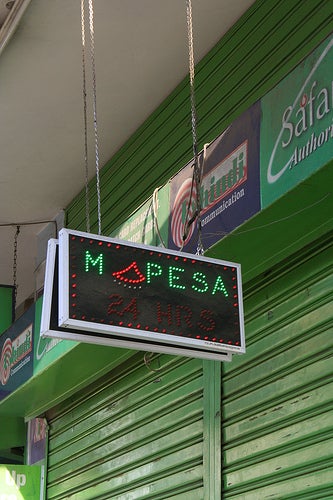 The most striking thing about mobile money in Kenya is how visible it is: the proliferation of store signage with M-PESA (and, increasingly, other mobile money and banking logos) leaves no one with any doubt that something big is happening in the Kenyan payment space.
The most striking thing about mobile money in Kenya is how visible it is: the proliferation of store signage with M-PESA (and, increasingly, other mobile money and banking logos) leaves no one with any doubt that something big is happening in the Kenyan payment space.
It is estimated that four out of five adult Kenyans have access to a mobile money account. This means that most people that any business touches –whether they are consumers, employees, business partners or retail staff— are connected to a real-time electronic payment network. That’s unprecedented in the developing world.
And yet few formal businesses have a dedicated mobile money account to conduct their financial transactions electronically, and among those who have one most do not appear to promote its use by their customers and suppliers particularly aggressively. Cheques remain the preferred payment mode for suppliers, or cash for smaller payments. M-PESA payments might be taken from customers if they insist and M-PESA might be used to pay field staff in exceptional or emergency situations, but then staff’s personal mobile phones are most likely to be used. Few enterprises have any vision about how they can use mobile money to re-engineer how they do operate, taking cash out of their business. The tidal wave of M-PESA is but a mere ripple for most businesses.
Informal businesses seem to be more ready to use M-PESA than formal businesses, despite the absence of specialized tools to help them. M-PESA has made it easier for entrepreneurial people to break out geographically in terms of where they source their inputs and where they sell their goods and services. They will typically make entirely pragmatic decisions on when to use M-PESA versus cash, on a case-by-case basis.
These are our main finding from over 75 interviews we conducted with business of all types in Kenya, under the auspices of the Financial Sector Deepening Trust of Kenya (see study results in this FSD Insights paper). In retrospect, that should not have been a surprise. Beyond a few large utility companies and supermarkets, one doesn’t see many businesses post a business M-PESA account number prominently on their store-front, their website, their invoices or their stationery. Why don’t businesses loudly proclaim an M-PESA number that anyone can pay them on?
We posit four main types of reasons why mobile money is proving slow to spread across businesses in Kenya:
First, mobile money services are still largely closed-loop systems and do not offer easy integration with either business information technology (IT) platforms or traditional banking services. Companies simply do not want to have some of their transactions ‘stranded’ in a parallel transactional cloud.
Second, most businesses have not developed electronic payment authorization policies and procedures and are still using paper-based instruments (invoices and cheques) internally. Banks have largely failed to wean companies onto their internet banking platforms to conduct business operations beyond salary disbursements. So adopting mobile money within formal enterprises will require substantial change management and process redesign.
Third, applying M-PESA in a business context presents some trust issues which Safaricom will need to deal with. In a friends & family context there is a prior relationship between sender and receiver, but that’s not often the case in business transactions. The market is rife with stories of traders who were defrauded when they accepted M-PESA payments, either with fake transaction confirmation messages or real transactions which clients subsequently claimed had been sent in error and Safaricom reversed.
Finally, it also appears that Safaricom has not marketed corporate M-PESA services very widely or aggressively. Their corporate sales procedures seem slow and inflexible. Mobile operators are, after all, mostly consumer-oriented companies.
The potential for mobile money to grease the wheels of commerce is clear. Digital money is easier to store and transport securely than physical cash, and reduces opportunities for fraud. It supports the automation of inventory and fleet management within enterprises, and by shifting distribution networks from cash-on-delivery to prepaid it can reduce credit risks and speed up dispatch of goods across enterprises. It fosters the development of entirely new online commerce ventures. But, alas, M-PESA has only begun to scratch the surface of what’s possible.
Ignacio Mas is an independent consultant associated with Bankable Frontier Associates, and Amolo Ng’weno is Managing Director of Digital Divide Data in Kenya.


Join the Conversation